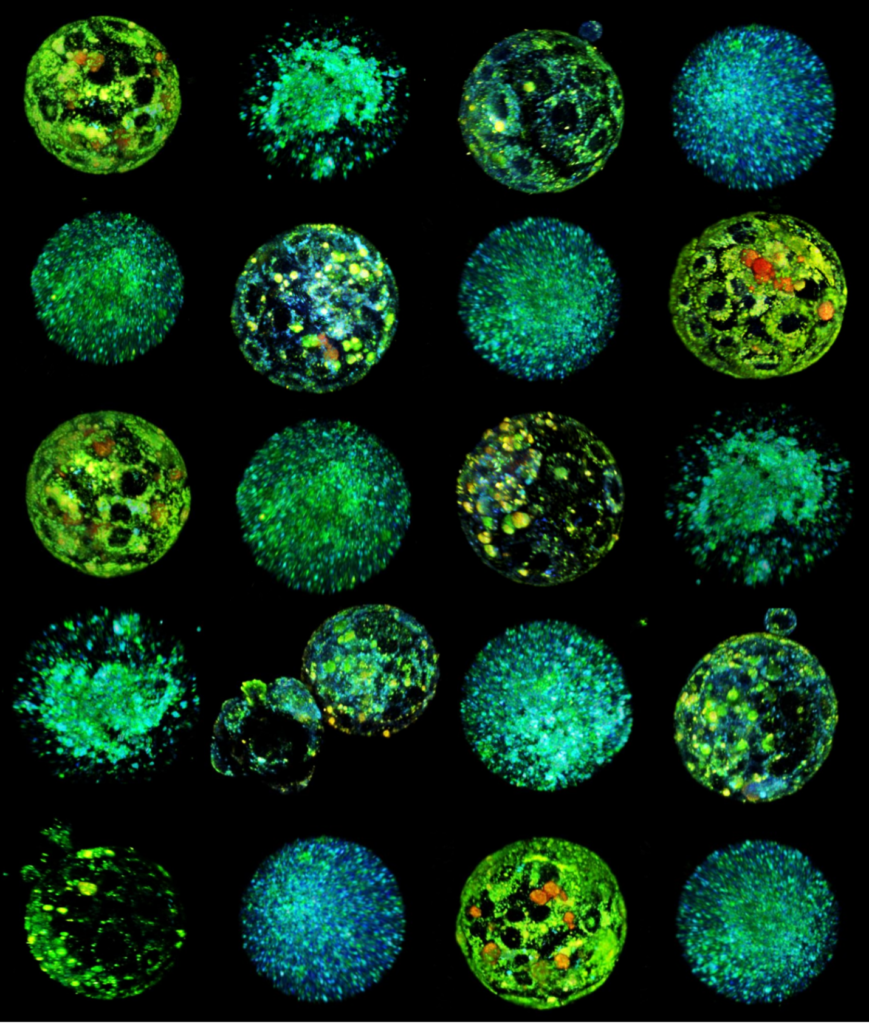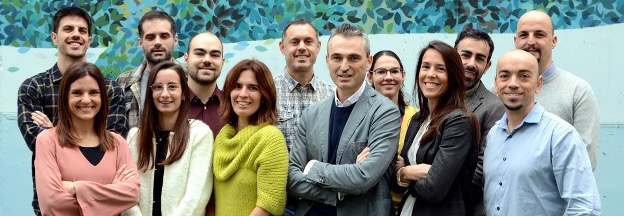ABOUT
Our lab’s focus is on understanding the mechanisms that control mammalian embryo implantation and apply that knowledge to provide solutions that improve human assisted reproduction techniques (ART).
The embryonic development of humans (and mammals in general) requires the implantation of the embryo into the walls of the maternal uterus. This process is highly inefficient as on average, 25–30% of conceptions lead to successful live births and around 60% of all conceptions are lost at the time of (or soon after) implantation. However, despite the central role of implantation in human fertility, the process is still elusive to experimentation because of its inaccessibility.
To overcome the elusiveness of this process, the group combines imaging and bioengineering methods to efficiently culture and image pre-implantation embryos and allow them to implant outside the uterus in highly physiological conditions. Our systems are accessible to imaging tools which allow us to interrogate the genetics, metabolomics, and mechanics of the embryo in a high throughput manner. Using our systems, we are capable to (i) improve embryo culture conditions and (ii) diagnose embryos with improved implantation potential.
Label-free microscopy and multi/hyperspectral imaging
Label-free Microscopy: This technique allows for analyzing cells in their native condition, i.e. without being labeled or altered in any way, by means of retrieving cells autofluorescence signals and thus providing essential metabolic information about living tissues. Combined with multispectral methods, we delve deep into the metabolic complexity of embryos and oocytes, revealing insights previously unattainable.
Hyperspectral Imaging: Our groundbreaking approach employs hyperspectral imaging to obtain the metabolic profiles of embryos and oocytes. This methodology allows us to identify key characteristics at the metabolic level, invisible to conventional techniques like brightfield imaging, offering a unique window into fundamental biological processes.
Hardware Techniques: We have extensive expertise in a variety of advanced microscopy techniques, including two-photon microscopy, laser scanning confocal microscopy, spinning disk confocal microscopy and light-sheet microscopy. The integration of these techniques with multi/hyperspectral detection methods enables us to observe biological samples of interest at cellular level with spectral characteristics.
AI and Software Analysis: We employ sophisticated data analysis tools such as spectral histogram analysis and phasor-plot analysis combined with artificial intelligence (AI) methods for classification. These techniques allow us to interpret complex multi/hyperspectral data and draw meaningful conclusions about the viability and quality of embryos and oocytes.

4D (x, y, z, and λ) Hyperspectral Autofluorescent Images of Mouse Oocytes and Blastocysts. The samples were imaged using a Zeiss LSM780 inverted microscope with a C-Apochromat 40x/1.20 W Korr Zeiss objective. The imaging conditions were maintained at 37°C and 5% CO2. A Mai-Tai DeepSee laser provided two-photon excitation at a wavelength λex = 780nm. The emitted autofluorescence spanned from 410 nm to 695 nm and was collected by a 32-channel PMT GaAsP spectral detector. The image captures multiple planes, separated by 2.5μm and 5μm steps for oocytes and embryos respectivelly. The pseudo-color representation of the hyperspectral images was achieved using additive blending to integrate the 32 channel colors for each pixel.
Bioengineering to improve embryo implantation
We have developed proprietary 3D ex vivo hydrogel-based implantation platforms which mimic the uterine microenvironment, allowing the embryo to progress towards post-implantation stages in an amenable way for optical microscopy. Working towards obtaining dynamic control of embryo culture, we have integrated our hydrogels in a microfluidic device allowing for controlled nutrient supply, oxygen concentration and long-term embryo culture. Our 3D ex vivo hydrogel-based implantation platforms allow for drug screening and determination of its impact on embryo implantation and development.
We use our 3D ex vivo implantation platform to understand embryo implantation with a focus on the biomechanics of the system. To this means we quantify the displacement of the matrix generated by the embryos using PIV or DVC algorithms. We look at the forces and resulting patterns embryos are applying in order to penetrate the hydrogel and also how external forces affect embryo implantation.
Human Embryo implanting on a 3D platform (video)
Embryo Culture Supplements Development from Human Plasma
Traditionally, embryo culture relied on Human Serum Albumin (HSA) as a key protein component. However, HSA underrepresents the rich composition of proteins present in human plasma. We work with a new-generation of supplements, which go beyond mere albumin, encompassing essential components such as growth factors and globulins, crucial for fostering optimal embryo development. In our group, we test new supplements to enhance embryo development and implantation. Our clinical grade human-derived supplements improve blastulation and implantation rates both in human and mouse embryos, showing superior lineage segregation and spatial organization compared to control counterparts.
The Bioengineering in Reproductive Health is the first Open Innovation Lab research unit at IBEC.
Due to the high translational component of our research, we have established collaboration contracts with the pharma industry, hospitals, and venture capital to bring our technology to the clinics and the market. Our Open Lab is a multidisciplinary environment where embryologists, cell biologists, optical physicists, biophysicists, and business developers synergize to create a unique environment shaped by science and entrepreneurship.
STAFF
PROJECTS
European Projects
| HSMe-ImPredict · Development of non-invasive imaging methodology for improving embryo implantation prediction, via hyper-spectral metabolic profiling (2022-2024) | Marie Curie Individual Fellowship | Samuel Ojosnegros |
National projects
| HYSPLANT · Selección de embriones para fecundación in vitro: predicción del éxito de implantación mediante clasificación metabólica de embriones (2020-2023) | MINECO Retos investigación: Proyectos I+D | Samuel Ojosnegros |
| Prediction of implantation success by hyperspectral metabolic profiling of human embryos obtained by in vitro fertilization (2020-2022) | AGAUR Beatriu de Pinós 2018 | Samuel Ojosnegros |
Private sector
| Estudio del mecanismo de acción de OXO-001 (2020-2022) | Oxolife | Samuel Ojosnegros |
| Evaluación de derivados plasmáticos humanos para el cultivo de embriones (2019-2021) | IVFTECH S.L. | Samuel Ojosnegros |
| Evaluación de derivados plasmáticos humanos para el cultivo de células mesenquimales y CAR-T (2020-2022) | IVFTECH S.L. | Samuel Ojosnegros |
| Prediction of implantation success by single-cell transcriptomic profiling of human embryos obtained by in vitro fertilization (2018-2022) | Scranton Enterprises BV | Samuel Ojosnegros |
Finished projects
| HYSPLANT · Metabolic profiling of in vitro fertilization embryos using hyspectral imaging (2019-2020) | European Commission ATTRACT | Samuel Ojosnegros |
| Embryo on a chip: Smart microdevice development for high-throughput screening embryo implantation (2020) | Tecniospring 2020 | Maria Demestre Viladevall |
NEWS
Desenvolupen una tècnica pionera per saber si un òvul és bo
El grup Bioenginyeria en salut reproductiva de l’Institut de Bioenginyeria de Catalunya (IBEC) apareix als mitjans per la seva participació en el desenvolupament d’un dispositiu que ofereixi informació metabòlica de … Read more
Investigadors de l’IBEC formen part del projecte europeu ATTRACT per desenvolupar un dispositiu de diagnòstic que millori la selecció d’embrions per als procediments de fertilització in vitro
El projecte HYLIGHT, coordinat per Samuel Ojosnegros de l’IBEC, va ser seleccionat per la fase 2 de la convocatòria ATTRACT, una iniciativa de la Unió Europea per impulsar la transferència de tecnologies amb gran potencial dels laboratoris a la societat. El projecte va ser finançat amb prop de 2 milions d’euros durant 26 mesos i té com a objectiu desenvolupar un dispositiu de diagnòstic per seleccionar embrions basant-se en els seus perfils metabòlics i augmentar les taxes d’èxit de les tècniques de fertilització in vitro.
El IBEC recibe cerca de un millón de euros para estudiar las enfermedades respiratorias graves causadas por virus
El projecto REACT, liderado por el Statens Serum Institut de Dinamarca, cuenta con la participación del Instituto de Bioingeniería de Cataluña (IBEC) que, con un presupuesto cercano al millón de euros de un total de siete, generará organoides epiteliales nasales humanos específicos como plataformas de validación y modelos preclínicos para investigar la interacción huésped-patógeno .
Les teràpies regeneratives del futur van confluir al Simposi IBEC, amb experts internacionals i més de 300 inscrits
Més de tres-cents experts internacionals en el camp de la investigació en teràpies regeneratives es van citar al simposi organitzat per l’Institut de Bioenginyeria de Catalunya (IBEC) per presentar els últims avenços en miniòrgans, òrgans-en-un-xip, bioimpressió 3D i enginyeria de teixits, entre d’altres.
Els empresaris del futur visiten l’IBEC
Estudiants MBA visiten l’Institut de Bioenginyeria de Catalunya (IBEC) en una jornada organitzada per Barcelona Global.
IBEC i Oxolife inicien un estudi pioner per tractar la infertilitat
Oxolife, la startup biotecnològica focalitzada en el desenvolupament de fàrmacs per a la millora de la fertilitat femenina, i el Laboratori de Bioenginyeria en Salut Reproductiva de l’Institut de Bioenginyeria de Catalunya (IBEC), combinaran dues tecnologies pioneres per a l’estudi i tractament de la infertilitat.
Senior researcher at the Bioengineering in Reproductive Health Research Group
Application Deadline: 15/07/2020Ref: SR-SO The Bioengineering in reproductive health group at the Institute for Bioengineering of Catalonia (IBEC) is looking for a Senior Scientist to develop a project in collaboration with the industry. The project involves investigate the molecular mechanisms affected by specific chemical treatments on endometrial receptivity and on mouse and human embryos in culture. We aim to combine the expertise in microscopy of the lab with embryology tools to understand the morphological and molecular modifications that lead to an increase in endometrial receptivity. An ideal candidate will have experience in the mouse or human embryology field and will know basic tools of molecular biology. The candidate will have a great degree of independence to coordinate the project, competitive salary and funding to outsource several tests (i.e. sequencing, histology etc.). Our laboratory is a multidisciplinary environment where biologists, biophysicists, clinicians and business developers synergize to create a unique environment shaped by science and entrepreneurship. Due to the high translational component of our research, we have established collaboration contracts with the pharma industry, hospitals and venture capital to bring our technology to the clinics and the market. In our lab we use bioengineering methods to create 3D environments that support embryonic development outside of the mother uterus. Our systems are accessible to imaging tools which allow us to interrogate the genetics, metabolomics and mechanics of the embryo in a high throughput manner. Using our systems we are capable to (i) improve embryo culture conditions and (ii) diagnose embryos with improved implantation potential.
Cell culture lab technician at the Bioengineering in Reproductive Health Research Group
Application Deadline: 30/06/2020Ref: LT-SO The Bioengineering in Reproductive Health Group offers a lab technician position for an experienced cell culture technician to develop a project in collaboration with the industry. The project involves testing the effects of different cell culture supplements on several cell types (e.g. Mesenchymal Stromal Cells, CAR T Cells, etc.) Our laboratory is a multidisciplinary environment where biologists, biophysicists, clinicians and business developers synergize to create a unique environment shaped by science and entrepreneurship. Due to the high translational component of our research, we have established collaboration contracts with the pharma industry, hospitals and venture capital to bring our technology to the clinics and the market. In our lab, we develop high-tech projects in the fields of embryology, cell biology and imaging. Our strategy involves the development of new products for the pharmaceutical industry. The current position seeks a motivated cell culture technician with experience in diverse cell culture systems.
L’IBEC signa un acord per 1.5 milions d’euros amb Scranton Enterprises
L’Institut de Bioenginyeria de Catalunya (IBEC) ha signat un acord per una ronda d’inversió inicial d’un milió i mig d’euros amb Scranton Entreprises B.V. -una associació d’inversió amb seu als Països Baixos-, amb la finalitat de desenvolupar tecnologia que predigui la probabilitat d’implantació d’embrions obtinguts mitjançant la fecundació in vitro. Aquest acord és el primer que s’estableix en el marc de la nova iniciativa de l’institut, l’Open Innovation Lab, que ofereix a empreses i inversors una plataforma per a portar de manera més àgil la recerca d’avantguarda als pacients i al mercat.
Desxifrant el llenguatge de les cèl·lules
Conèixer el mecanisme de comunicació intercel·lular que regula el posicionament de cèl·lules obre camí cap al desenvolupament de teràpies dirigides en medicina regenerativa Conèixer el llenguatge de les cèl·lules per poder-les redirigir cap a on sigui necessari. Aquesta és una de les possibilitats obertes pels investigadors del Centre de Medicina Regenerativa de Barcelona (CMR[B]), liderats pel Dr. Samuel Ojosnegros, que han aconseguit descriure en el seu últim estudi el mecanisme de comunicació intercel·lular implicat en el posicionament de les cèl·lules. El treball, publicat per la prestigiosa revista Proceedings of the National Academy of Sciences (PNAS) , compta amb la col·laboració dels grups d’Elena Martínez (IBEC) i Melike Lakadamyali (ICFO), entre d’altres. La fructífera col·laboració també ha donat lloc a la publicació del treball de la Verónica Hortigüela, ex estudiant de doctorat al grup de l’Elena, que ha dissenyat un patró nanomètric de proteïnes que permet controlar aquest mecanisme de comunicació.
JOBS
Embryology Laboratory Technician at the Bioengineering for Reproductive Health Research Group
Ref: PD-SO/Deadline: 04/04/2024
Open postdoc position on embryology at the Bioengineering in Reproductive Health Research Group
Ref: PD_SO/ Deadline: 12/02/2024
Research Assistant at the Bioengineering for Reproductive Health Research Group
Ref: RA_SO/Deadline: 20/11/2023
Postdoc on microscopy at the Bioengineering in Reproductive Health Research Group
Ref: PD_SO//Deadline: 1/11/2023
Postdoctoral researcher at the Bioengineering in Reproductive Health Open Lab (Ref: PD_SO)
Ref: PD_SO // Deadline: 19/01/2023
Embryologist at the Bioengineering in Reproductive Health Research Group (Ref: LT_SO)
Ref: LT_SO // Deadline: 19/01/2023
Biochemist at the Bioengineering in Reproductive Health Research Group
Reference: LT-SO / Until Oct 15th, 2022
PUBLICATIONS
S Ojosnegros, A Seriola, AL Godeau, A Veiga (2021) Embryo implantation in the laboratory: an update on current techniques. Human Reproduction Update, Vol.00, No.0, pp. 1–30.
Martin Plöschner, Denitza Denkova, Simone De Camillis, Minakshi Das, Lindsay M. Parker, Xianlin Zheng, Yiqing Lu, Samuel Ojosnegros, and James A. Piper (2020) Simultaneous super-linear excitation-emission and emission depletion allows imaging of upconversion nanoparticles with higher sub-diffraction resolution. Optics Express 28 (16), 24308-24326.
EQUIPMENT
- Embryo culture laboratory
- IFV workstations in laminar flow hoods
- Microscope
- Micromanipulation-microinjection station
- Embryo biopsy laser
- K-systems incubator
- Cell culture laboratory
- Biosafety cabinets
- Incubators
- Automated cell counter
- Dry warming/thawing system
- Sterile tubing welder
- Tubing sealer
- Centrifuges
- Advanced live imaging: photoconversion, 3D imaging, light scattering, spectroscopy
- Crest spinning disk mounted on a Nikon Ti
- Image analysis workstation
COLLABORATIONS
- Prof. Anna Veiga – Barcelona Stem Cell Bank (IDIBELL) and Dexeus Mujer, Barcelona
- Dr. Montserrat Boada/ Dr. Pere Barri – Dexeus Mujer, Barcelona
- Dr. Ayelet Lesman – Tel Aviv University (TAU), Israel
- Dr. Elena Martínez – IBEC
- Dr. Francesco Cutrale, University of Southern California (USC), USA
- Dr. Manuel Irimia – CRG, Barcelona
- Dr. Javier Ramón – IBEC
ENTREPRENEURSHIP
· Jorge Fuentes,
Business Strategy, A_Ventures, Barcelona, Spain
 |  |  |  |
 |  |
Follow us on Twitter: @Biorephealth

